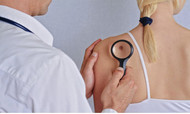May is Skin Cancer Awareness Month
Posted by Peggy Demetriou, APRN, FNP-BC on 22nd May 2021
There are over 5 million cases of skin cancer diagnosed in the United States each year, making skin cancer the most common cancer in America. About 90 percent of nonmelanoma skin cancers and 85 percent of melanoma cases are associated with UV radiation from the sun. This also makes it a very preventable cancer (CDC).
Fast Facts About Skin Cancer According to the CDC:
- Skin cancer is the most common cancer in the United States, and includes different types.
- Unprotected skin can be damaged by the sun’s UV rays in as little as 15 minutes.
- Even if it’s cool and cloudy, you still need protection. UV rays, not the temperature, do the damage.
- Anyone can get skin cancer, but some things put you at higher risk.
- The most common signs of skin cancer are changes on your skin, such as a new growth, a sore that doesn’t heal, or a change in a mole.
Skin cancer can develop in people of all races, ages, and nationalities. It can also develop on any area of the body including these 6 unlikely places:
- Scalp, Lips, Hands, Feet, Groin, and Eyelids.
Basal cell carcinoma and squamous cell carcinoma (ADA)
- These are the most common forms of skin cancer and are collectively referred to as non-melanoma skin cancers.
- These arise within the top layer of the skin and can appear on any sun-exposed area of the body, but are most frequently found on the face, ears, bald scalp, and neck.
- Basal cell carcinoma frequently appears as a pearly bump, whereas squamous cell carcinoma often looks like a rough, red, scaly area, or an ulcerated bump that bleeds.
- Although non-melanoma skin cancer spreads slowly, if left untreated, it can lead to disfigurement.
- Researchers estimate that 5.4 million cases of non-melanoma skin cancer, including basal cell carcinoma and squamous cell carcinoma, were diagnosed in 3.3 million people in the United States in 2012.
- See a board-certified dermatologist if you spot anything changing, itching, or bleeding on your skin.
- When caught early and treated properly, skin cancer is highly curable.
Melanoma
- This is the most deadly form of skin cancer.
- Nearly 20 Americans die from melanoma every day.
- Melanoma may suddenly appear without warning but can also develop from or near an existing mole.
- It can occur anywhere on the body, but is most common on the upper back, torso, lower legs, head, and neck.
- Melanoma frequently spreads to lymph nodes and most internal organs, making early detection and treatment essential.
- See a board-certified dermatologist if you spot anything changing, itching, or bleeding on your skin.
- New, rapidly growing moles, or moles that itch, bleed, or change color are often early warning signs of melanoma and should be examined by a dermatologist.
- If detected early and treated properly, melanoma is highly treatable.
Skin Safety Tips According to the CDC:
- Stay in the shade late morning until early afternoon
- Can’t stay in the shade? Wear a long-sleeved shirt and pants, preferably with UV coating<
- Reapply sunscreen every 2 hours and after swimming, sweating and toweling off
Consider switching to Medical Grade Sunscreens
- Medical grade products are made up of proven ingredients that are purchased with a medical license and only available through your health care provider. These products are developed through clinical research and the amounts of active ingredients (what’s actually going to make changes in your skin) are much higher than what over-the-counter products are legally able to contain. Medical grade products penetrate the skin better and deliver a higher concentration of active ingredients. Higher amounts of active ingredients = better skin! They are also cosmetically more elegant leading to better compliance of use on a daily basis. (Dr. Jane Olseon, MD).
- Our office carries four lines of medical grade sunscreens including Obagi, Skinceuticals, Neocutis and Skinmedica. All backed by research and are clinically proven to provide you with highest form of protection against skin cancer and aging changes. We also carry the very popular Bluestone Sunshields that are coated with 99% UVA/UVB protection for fashionable outdoor protection. Visit our online store by clicking on the link below.

